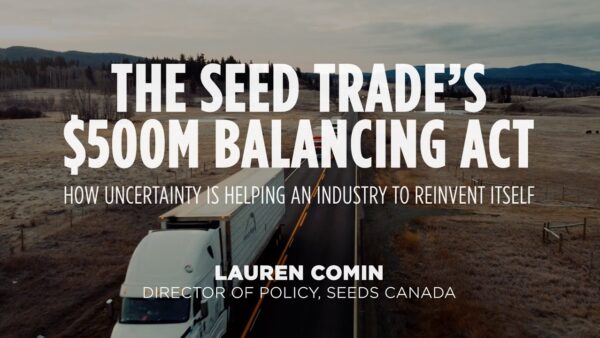Member companies share their impression about CropLife International.
Why It Matters: CropLife International (CLI) represents the world’s leading R&D companies – BASF, Bayer, Corteva Agriscience, FMC, Sumitomo Chemical, and Syngenta – who are actively working to address some of our world’s biggest challenges.
The organisation has a global network of 91 associations, and a diverse range of partners. It seeks to increase food security, adapting to and mitigating climate change, and protect biodiversity. Seed World Europe checked in with several of the CLI member companies to get their take on the organisation.
Read our profile with Emily Rees, the President and CEO of CropLife International here.
CropLife is Connecting Innovation-driven Companies in Agriculture
By: Melanie Bausen-Wiens – Senior Vice President Regulatory, Sustainability & Public Affairs Agricultural Solutions at BASF
We all know that farmers today face a variety of challenges, such as a rapidly growing global population, climate change, and biodiversity loss, as well as producing food sustainably on less arable land. That’s why, for me, it is clear — farming is the biggest job on Earth. At BASF, we do everything in our power to build a sustainable future for agriculture by connecting innovation, customers, and society.
However, a sustainable future of agriculture cannot be created alone. This is why uniting the main players in the agricultural sector is a key task. CropLife International (CLI) and other related organizations have played a major role in connecting innovation-driven companies in agriculture. With its coordinated approach along the entire value chain, CropLife International is an important ally for us in driving innovative technologies, advocating for trade and regulatory policies and supporting farmers to increase food production, protect biodiversity and tackle climate change.

Since establishing CropLife International, the agricultural industry has come a long way. For example, CropLife International worked continuously with safety experts and regulators on the commitment to regulatory data transparency. This topic is close to our heart, to build trust in the safety data and ensure that farmers are provided with high-quality, safe products.
BASF also collaborated with CropLife at the G20 agricultural ministers meeting in Brazil this year. Livio Tedeschi, as CropLife Chairman of the Board and co-Chair of the B20 Sustainable Food Systems and Agriculture Task Force, summarized the drivers for change as the need to prioritize sustainable productivity growth, developing breakthrough financing models to secure sufficient capital for large-scale transition, and support for the WTO’s rule-based agricultural trade system. We at BASF Agricultural Solutions connect seeds and traits, crop protection products, digital tools and sustainability approaches to help deliver the best possible outcomes for farmers, growers and other stakeholders along the value chain. While the demands from politics and society are growing, partnerships with CropLife International are crucial to share our expertise and positions as well as successfully make progress and show our contribution to sustainable agriculture. However, I believe that CLI’s most significant achievement is its commitment to engaging with the public and promoting a better understanding of sustainable practices for enhancing agricultural yields. By bridging the gap between industry advancements and public perception, CLI fosters a more informed and constructive dialogue on agricultural innovation and creates a platform for collaboration between different stakeholders.
Together with partners like CropLife International, we can help farmers grow healthy, high-quality food safely and protect the land that we are all safekeeping for future generations.
CropLife Offers an Essential Global Perspective That Fosters Innovation
By: Frank Terhorst – Head of Crop Strategy & Sustainability at Bayer’s Crop Science Division
As we are working towards scaling regenerative agriculture systems, we rely on our internal expertise and on strong partnerships that accelerate innovation in addressing food security and climate change on international, regional and global levels.
Our ambition is to help the world produce 50% more food by 2050 while restoring nature. This means there is a constant need to develop new solutions to meet these challenges, and we cannot tackle them alone to help farmers be successful. In today’s complex landscape, where geopolitical trends and environmental issues converge, CropLife International (CLI) offers an essential global perspective that fosters innovation.

The recent agreement between CLI and the International Seed Federation (ISF) and 11 other stakeholders on collectively addressing illegal seed practices illustrates this collaborative spirit, as we work together with regional seed associations and our extensive networks to create a more favourable operational landscape for all stakeholders. Together, we advocate for a science-based, proportionate policy environment.
CLI complements the efforts of seed trade organizations filling critical gaps in technical expertise and local networks, especially where resources are limited. The collective involvement of associations enables us to be vocal in critical policy areas.
Typically, at UN negotiations, OECD and FAO events provide a seat at the table which underscores our commitment to a united front on pressing issues.
Most recently, Bayer worked with CLI at the G20/B20 meeting in Brazil, where the inclusion of regenerative agriculture and breeding innovations in the Ag Ministerial declaration represents a significant step forward, paving the way for solutions that support farmers in preserving their livelihoods.
The partnership between CropLife, its members and its collaborative work across key agricultural sectors will continue to help shape a sustainable agricultural landscape that benefits farmers, society, and the planet. Together, we are committed to driving innovations in regenerative agriculture and fostering a resilient and thriving global food system for future generations and that’s a great fit with Bayer’s mission Health for all, Hunger for none.
CropLife Brings Together Partners Around the Key Challenges Facing Farmers and Agriculture
By: Alexandra Brand – Executive Vice President, Sustainability and Corporate Affairs at Syngenta Group.
CropLife International (CLI) plays a crucial role in bringing together partners around some of the key challenges facing farmers and agriculture. As a global advocate for advancing innovation in agriculture, it highlights how our industry can make farming more sustainable and contribute towards achieving global climate, food security, and biodiversity goals. It also promotes initiatives and activities areas around the world including stewardship, farmer training, the identification and reduction of illegal and counterfeit trade, and the safeguarding of intellectual property rights.
On key issues such as supporting effective regulatory environments and reducing barriers to international trade, CLI and CropLife Europe work together with the ISF and other seed associations to promote frameworks that are science-based, progressive, and support farmer access to cutting-edge agricultural innovations. With its deep understanding of perspectives spanning both crop protection and plant biotech, CLI’s ability to share insights engage with stakeholders and decision makers is crucial. Current regulatory fragmentation is hindering farmer access to competitive and transformational agricultural technologies. This is increasingly challenging given the rapid spread of destructive pests and diseases, exacerbated by import restrictions that disrupt seed supplies. CLI’s work, together with other industry stakeholders, is also important to driving and strengthening our industry’s response to the global challenges of food security and climate change.

Over the years, CLI has made significant inroads on several initiatives. In 2024, CLI has been instrumental as co-chair of the B20 Sustainable Food Systems and Agriculture Task Force, on food system transformation, improving climate resilience, and farmer productivity. This task force developed a policy paper championing agricultural innovation, including genome editing, improved seed varieties, biological crop protection, and feed additives.
This collaboration demonstrates how cutting-edge technologies can enhance crop resilience, improve resource efficiency, increase farmer profits, and optimize pesticide use. The paper also calls for a WTO rules-based global trading system to facilitate access to innovative technologies and knowledge sharing. G20 agricultural ministers have supported various proposals, incorporating these in their final declaration, which called for sustainable intensification through innovation.
The Ministers specifically endorsed plant breeding innovation as a key technology. It’s very exciting to see CLI now drive next steps to turn these recommendations into practical applications worldwide, and to pursue its work with stakeholders and member companies to advocate for these policies at the global and country levels.













